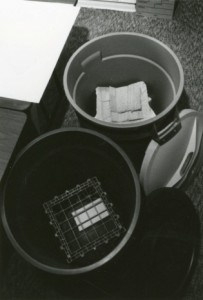
This blog is part of a special behind the scenes series for Archives Month.
Connor Graham, processing archivist
The Processing Room is where we clean and organize documents so they can be properly preserved. Removing staples and paperclips, photocopying acidic documents, unfolding papers, and placing records in acid-free folders and boxes are among the basic preservation techniques that we use on a daily basis at the Delaware Public Archives.
When a document comes to the Archives, it is not always in pristine condition. Sometimes it comes rolled up or folded accordion style. In order to flatten out the documents we use the process of humidification.
This is what we at the Delaware Public Archives call a humidification chamber, but most will recognize it as a basic trash can.

The next step is to take 4-5 sponges, wet them, ring them out to make sure they are not dripping wet, and then place them at the bottom of the trash can. You then place a milk crate over top of the sponges and basically cage them in.
Next step is to lay the document over top of the milk crate and place the lid on the trash can. We usually let the document sit for 1-2 days depending on the condition.
When the humidification process is over, we pull the document out of the chamber. At this point the document is slightly damp and wrinkles have been loosened up. To ensure that the document will stay flat we lay it between two sheets of acid-free blotter paper and place weights on top of it. After a couple days, the document is ready to be organized, foldered, and put away in our vaults.

Do you want to know more about what happens behind-the-scenes at the Delaware Public Archives? Send us your questions and we may feature them here for Archives Month.
Related Topics: preservation, Records Preservation